“Blessed are You, G-d our Lord, King of the universe, Who spreads out the earth upon the waters.”
“Blessed are You, G-d our Lord, King of the universe, Who fortifies humanity’s footsteps.”
“Blessed are You, G-d our Lord, King of the universe, Who provides for all my needs.”
Those are the ninth, tenth, and eleventh of the Morning Blessings that Jews recite every day. Elana Friedman, my Hebrew tutor from my seminary days, had a beautiful way of visualizing them.
“I need to cross over the water, so G-d spreads earth for me to step on. Then He solidifies the earth into separate stones and makes them firm so I won’t slip and fall. And each one is leading me along a path that will fulfill my needs.”
I love that image. It’s stuck with me for decades. Jewish readers may recognize its similarity to another saying, credited to Rebbe Nachman of Breslov: “The whole world is a very narrow bridge, and the most important thing is not to be afraid.”
Elana envisioned the bridge of stepping stones, but I’ll add that some of those stones have hidden contraptions in them. Sometimes, if you step on one in just the right way, secret passages may open up that lead you to buried treasure.
Dorothy Day’s Mary House was a perfectly constructed stepping stone for a young commie to be introduced to her spiritual heritage. The quirky Amelia was the perfect messenger to lead me to my next step. And that next step, Reb Shlomo Carlebach’s synagogue at 305 West 79th Street, contained the contraption hiding the treasure.
I followed Amelia’s instructions and showed up in the afternoon, several hours before sunset. West End Avenue was completely unlike anywhere else I’d been in the city. No trendy clothing shops like in the Village. No chaotic swarms of people like on the subways. Not even a hot dog vendor! All I could see up and down the avenue were rows of old but well-maintained apartment buildings, a few made especially elegant with their decorative moldings.
The synagogue was the shortest building on 79th Street – only two stories. The ground floor housed the shul, the place for prayer, and it was unspectacular, if not a little shabby. It wasn’t much different than any of the Reform or Conservative shuls my Dad had taken me to. Of course, it had all the important ritual items. Standing front and center was the ornate wooden closet where the Torah scrolls were kept, the doors covered by a velvet curtain embroidered with gold Hebrew letters. A bit beyond that was the table where the scroll could be laid out and read. And on either side was a stained glass window with a Star of David. The rest of the room was painted in plain light blue, and there were unmatched chairs lined up for the congregants. But had the shul been fancier, I would have been turned off. I considered materialism to be the most unspiritual of human traits.
The only other person in shul was a short, thin man with a trim, brown beard. “May I help you?” he asked.
“Um, I heard that it’s a holiday tonight, but I was told that if I didn’t have any money, I had to show up early and work.”
“And you heard about Reb Shlomo,” he added, knowingly. “From who?”
“Amelia.”
He didn’t ask how or where I’d met her, so I didn’t say. Nor did I repeat her exact words, though they were echoing in my head. “Everything female falls in love with him.” More than hoping to fall for Reb Shlomo. I was hoping he’d fall for me.
“The kitchen is upstairs,” the man told me, leading the way through a door on the right. “Chaya’s there now. She’ll put you to work.”
Upstairs was an apartment with a dining room in front, and a hallway leading to the kitchen and bedrooms. I didn’t know it, but that dining room would fill up with thirty to fifty people for the holiday meal that night.
“This place feels like the Old World,” I thought to myself.
I would have caught that vibe even if the walls hadn’t been lined with books covered in Hebrew lettering. This was ambience, not appearance. And I don’t think there was a particular smell triggering my memory associations either. I don’t remember the scent of traditional Jewish foods wafting through the air, no sweet challahs baking or chicken soup simmering on the stovetop. Perhaps they were there residually. The main thing is, I knew that “feel.”
The one and only time I’ve truly felt déjà vu, that disorientation that comes from being both in the present moment and in the throes of a vivid memory, was in a home just like that one. It was also on the Upper West Side, the apartment of my friend’s great-grandmother, an elderly European-born Jew. But it wasn’t déjà vu now. Just me recognizing the familiar.
“This young lady is here to meet Reb Shlomo and volunteer in the kitchen,” said the bearded man, introducing me to Chaya. She had jet black hair and olive skin, so I assumed she was Israeli. “Amelia told her about us.”
The two of them exchanged a meaningful look. Now that I’m Orthodox myself, I can guess what they were thinking. “Look at how G-d runs the world! Using Amelia, of all people, as His messenger!” or, “So many Jewish souls drift through here, and now, we’ve got one more.”
Chaya took charge. “Reb Shlomo will be back in a while,” she said in her mild accent, “but there’s plenty to do till then.”
She put me to work washing lettuce leaves for a salad. I did it until the cold running water on my hands made me wince, and then she gave me vegetables to chop instead. Meanwhile, people streamed in and out, looking for Reb Shlomo. The ones closest my age fascinated me most: a young man and woman, both in their early twenties. They were religious, so they were unlike anyone in my school, but they had an air of confidence that intimidated me into near silence. While I watched, listened, and worked, they chatted with Chaya about their recent trips to Israel.
“Oh my gosh! It was the best year of my life!”
“I want to go back already.”
“Me too.”
Then Chaya thought of including me in the conversation. “Have you been to Israel?” she asked.
“No, but I’d like to,” I answered.
“You’ve got to!” they all said.
“It’s the experience of a lifetime!”
Well, that sounded nice, but I didn’t see how it was possible. I was busy with my college plans. I felt I was broadening my horizons quite a bit already, just by showing up there.
Then, at long last, Reb Shlomo arrived. Everyone surrounded him, vying for his attention. He welcomed the two young travelers home, and I heard a repeat summary of their Israel experiences, and things like, “How special” and “It’s so good to have you back.”
Reb Shlomo was friendly and upbeat, but I couldn’t help but puzzle over Amelia’s warning. “Everything female falls in love with him?” I thought. He was a white-bearded old rabbi with a pot belly!
After greeting everybody else, he finally got around to me. In so gentle a tone it was almost a whisper, he asked Chaya, “Who’s this?”
The answer, of course, was that I was an assimilated Jew who had unwittingly wandered back into the fold. Reb Shlomo was quite likely happier to see me than I was to meet him, though I could never have imagined that. Neither did I imagine that when Amelia said I’d “fall in love,” she meant something way beyond romance. Reb Shlomo loved each and every human being. Love was his life’s mission.
I’ll let him say it in his own words and voice. . .
How much do we know about each other? The truth is, the truth is, every human being has G-d’s image. G-d is so deep. G-d is so hidden. We only have the privilege to love each other. This is one of the most important teachings of the holy Baal Shem Tov. What do you know of another human being? What do you know if they are holy or not? There are so many people who look to us coarse, a little bit unholy. Please, I bless you, don’t be the judge. Because you never know. You never know.
That video footage of the rainbow of humanity riding on the subways is the perfect backdrop to my story. I didn’t get to meet Reb Shlomo in the hippie days at the House of Love and Prayer. I met him in New York at the peak of the homeless crisis, and just like in the 60’s, he was in the thick of it. He was known as a friend to the homeless. Not only is it documented in his biographies1, when I became a regular at the shul, I would see the people who came looking for him. One of the highest spiritual experiences of my life was serving cake to a homeless man in the sukkah while we waited for Reb Shlomo.
But that came later, so it’s a story for another post. All I want to say now is that my stepping stones were laid out along New York’s subway tracks. From Dorothy Day’s Mary House to Reb Shlomo’s shul uptown, G-d sent me the cure for the ills I was soon to contract in university.
Holy Brother by Yitta Halberstam Mandelbaum and Holy Beggars by Aryae Coopersmith





